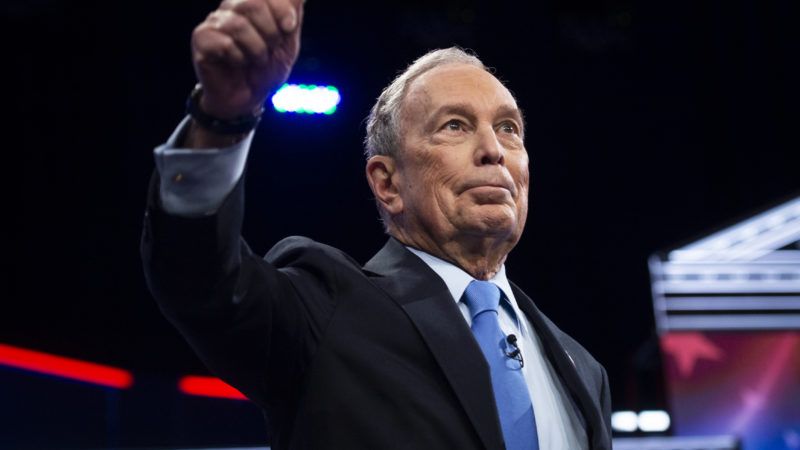Bloomberg Goes for Brokered Convention
Plus: red spots in blue states, blue spots in red states, the White House admits tariffs have hurt manufacturing, and more...

If you thought one miserable debate performance might force former New York City Mayor Michael Bloomberg to reconsider his $360 million (and counting) bid for control of the Democratic Party…that's not happening.
All those TV ads are just the start of Bloomberg's plot. Politico reports that Bloomberg's campaign has been quietly lobbying party officials to back him at a brokered Democratic convention. The effort appears to be focused not just on the so-called "superdelegates"—activists and officials who automatically receive delegate status—but on delegates pledged to former Vice President Joe Biden, former South Bend Mayor Pete Buttigieg, and other moderate candidates.
The Democratic National Committee changed its rules after Sen. Bernie Sanders (I–Vt.) and his supporters complained about the potential influence the superdelegates had in 2016. (Most of them backed Sanders' rival, Hillary Clinton, although she didn't need them to win the nomination.) This year, superdelegates won't be allowed to vote until the second ballot, if there is one.
If Bloomberg is serious about becoming the Democratic nominee—and all indications are that he is quite serious—a brokered convention is his most likely path. The forecasters at FiveThirtyEight say Bloomberg has less than a 10 percent chance of coming into the convention with enough delegates to win on the first ballot. But no candidate is currently in a good position to win on the first ballot.
On the other hand, the fact that Bloomberg is already making plans for a brokered convention is more than a little presumptuous. He has yet to earn a single delegate, after all, and he just got his clock cleaned at Wednesday's debate. Can he really survive another atrocious debate and still emerge as the most viable non-Sanders candidate after Super Tuesday?
Yes, argues Andrew Egger at The Dispatch, for the simple reason that not many people watch the debates:
In an ordinary presidential primary, a single bad debate performance can be enough to sink a candidate. Think of Rick Perry's failure to remember the name of a federal agency he would abolish, or Chris Christie savaging Marco Rubio for his robotic recitation of talking points before the New Hampshire primary in 2016. Taken purely on the merits, Bloomberg's performance certainly ranked among those: He looked consistently lemony and defensive, out-of-touch and mean, a far cry from the jovial, confident Trump-terminator he's portrayed himself as in campaign branding.
But this Democratic primary isn't an ordinary primary, and Bloomberg's electoral strategy has never hinged on scoring an effervescent victory on the debate stage. In fact, there's a sense in which the whole thesis of the Bloomberg campaign is that, in a divided field that overwhelms voters with options, a big enough infusion of cash can short-circuit the system and render sorting mechanisms like debates irrelevant altogether.
Trump won the Republican nomination in 2016 not because he was an outstanding debater—though he did have some memorable zingers, and he never had a performance quite as thoroughly bad as Bloomberg's was—but because he got gobs of free advertising from a media fascinated by his seeming train wreck of a campaign. Bloomberg has to buy his eyeballs, but the principle is the same. Being on TV a lot is better than being on TV less.
We won't begin to know whether Bloomberg's strategy is working until March 3. We probably won't actually know whether it worked until the convention. But if you think one bad debate will make him go away—hey, it's 2020, you should know better.
FREE MINDS
Seeing America as a collection of "red states" and "blue states" does little except encouraging tribalism, and ignores the reality of places like Leona Valley, California, or Beckley, West Virginia—two of the places where voters split most dramatically with the rest of their state, according to an analysis by The Washington Post's Philip Bump:
A White House staffer referred to Southern California as "occupied territory," a weird phrasing. But it prompted me to wonder: Where were the places in each state that deviated the most from the state vote overall? https://t.co/2sk74HaXKY
— Philip Bump (@pbump) February 20, 2020
FREE MARKETS
In its annual economic report, the White House quietly admits that President Donald Trump's trade policies have contributed to a global manufacturing slowdown. "At the heart of the current global slowdown has been a manufacturing downturn," the report says. "Uncertainty about trade policy is one often-cited culprit in the manufacturing slowdown, particularly uncertainty surrounding the Administration's negotiations toward a bilateral trade agreement with the People's Republic of China."
Despite the headwinds created by Trump's trade war, the report notes that "economic output has accelerated over the past 3 years…with output growth rising from 2.2 to 2.5 percent at a compound annual rate."
QUICK HITS
- The number of people serving life sentences in American prisons is now larger than the entire prison population in 1970.
- Intelligence officials worry Russia is trying to meddle in another election. Trump is mostly worried this might make him look bad.
- Trump is unhappy about Parasite winning Best Picture at the Oscars.
Trump goes after the Oscars. "And the winner is a movie from South Korea. What the hell was that all about? We've got enough problems with South Korea, with trade. And after all that they give them best movie of the year?" Says 'Gone with the Wind' (1939) should've won instead.
— Rebecca Ballhaus (@rebeccaballhaus) February 21, 2020
- Lawrence Tesler, who invented copy/paste, has died.
- Would you buy tickets to see a hologram of Whitney Houston perform?
- Incentives matter!



Show Comments (151)